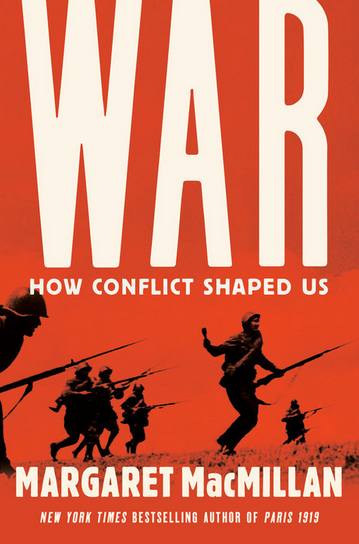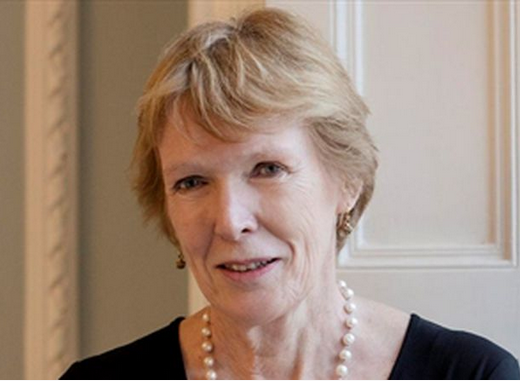A Historian ‘At the Height of Her Literary Powers’

Penguin-Random House Canada/October 2020
By Margaret MacMillan
Reviewed by Anthony Wilson-Smith
December 3, 2020
War, the iconic 19th century Prussian military theorist Carl von Clausewitz famously observed, “is a continuation of politics by other means.” Or, if you prefer the same sentiment differently phrased, consider Mao Tse-Tung: “Politics is war without blood, while war is politics with blood.”
Either way, the point is the same: while we like to think of taking up weapons as an unnatural step, doing so has been as much a part of human behaviour as other, more peaceful means for as long as we have been on this earth.
The reality, as the internationally renowned Canadian historian Margaret MacMillan observed recently, is that very often the act of going to war ‘is calculating, not impulsive.’ That is one of the hard truths underlying War: How Conflict Shaped Us, MacMillan’s concise, vividly compelling analysis of humankind’s ambivalent relationship with war — and why, despite enormous pain and cost, we continue to fight each other.
This is a remarkable book that MacMillan, who divides her time as a historian and scholar between the University of Toronto and Oxford (always defining herself as Canadian), is uniquely qualified to write.
It grew out of an invitation to give the BBC’s prestigious Reith Lectures series in London two years ago. But in many ways, it has been percolating through close to two decades during which she has produced five internationally successful, critically-acclaimed books, almost all of which deal with some aspect of conflict.
The publication in 2003 of Paris 1919 – her extraordinarily detailed rendering of the people, circumstances, strategies and motivations driving the peace talks at the end of the First World War – first showed her ability to mix deft, deeply researched storytelling with shrewd, well-reasoned insights. (In a recent appearance on the podcast The Herle Burly, she told the host, the political strategist David Herle, that she has been drawn to her subject because her area of historical expertise is the 19th and 20thcenturies, which “have had an awful lot of war.”)
Now, in War, (recently chosen as one of the New York Times’ 10 best Books of 2020) MacMillan effectively draws together all the lessons and information she has absorbed in her many years of studying the subject. In 272 pages brimming with supporting anecdotes and insights, she makes the case that the wish to fight is hard-wired into human nature. And, as MacMillan observes, war “brings both destruction and creation” – even as we choose to ignore the latter because it’s an inconvenient truth. Canada, for example, despite a terrible human toll, emerged with more autonomy from Great Britain at the end of the First World War; and came out of the Second World War more prosperous, industrially advanced and with a whole new set of social programs. War has also led to enormous technological and medical advances. Among them: penicillin, blood transfusions, jet engines, and computers – alongside, of course, the creation of fearsome weaponry, including the atomic bomb.
MacMillan outlines, with extraordinary sweep and scope, the many strategic uses, calculations and outcomes of war throughout history. Some of the leaders she cites include Alexander the Great, Roman general Fabius Maximus, Napoleon, Louis XIV, and Vladimir Ilyich Lenin. With equal facility, she draws from campaigns including the Peloponnesian War, the seminal Battle of Kosovo of 1389, the Franco-Prussian War, the Spanish-American War, and, of course, the First and Second World Wars.

Along the way, MacMillan tidily disposes of the popular notion that humans are unique in our fondness and propensity for conflict, and that other species are inherently more peace-loving. She cites Jane Goodall, who studied chimpanzees in their natural surroundings in Tanzania for more than half a century. Goodall initially thought the great apes were “nicer than most human beings.”
But upon closer and more prolonged study, she found that they engaged in organized conflicts against other groups; fought any outsiders trespassing on “their territory” and carried out raids in which they killed rivals, females and infants. (Chimpanzees share 99 percent of our DNA).
One reason humans fight each other, MacMillan observes, is, like it or not, there are distinctive advantages, at times, to doing so if prepared to pay the price. Like-minded people band together either to defend their interests and belief systems, or to subjugate those who see the world otherwise.
Wars are often fought out of need or greed; one side sees something they want that others have and moves accordingly to seize it. There is also a conundrum. People historically grouped into larger societies and structures in order to protect themselves from outsiders — but at the same time, those larger entities create an infrastructure that is better able and more willing to wage war. She cites the late American sociologist and historian Charles Tilly: “War made the state, and the state made war.”
None of this is to suggest that MacMillan is anything less than appalled by war. Rather, she believes that the best way to prevent — or at least limit the scope of — future wars is to regard them as a continuing danger rather than the happenstance result of an unlikely confluence of events.
The relative peace that Western countries and some others have enjoyed since the end of the Second World War in 1945 has, she suggests, led to the dangerous belief that this is the norm, and war the exception, which leads to complacency. “With new and terrifying weapons, the growing importance of artificial intelligence, automated killing machines and cyber war, we face the prospect of the end of humanity itself,” she writes.
Despite such justifiably gloomy prose, this is a hard book to put down. While I can’t claim to be an acquaintance of MacMillan’s, I’ve been at a number of small social occasions over the years where she has been a featured guest. In person, she is crisp, engaged, engaging in her opinions, but always looking to absorb information and opinions from others. Her writing reflects those qualities.
Just turning 77 (on December 23), MacMillan is, if anything, only now at the height of her literary powers. The cool, measured tone in which she makes her case adds to, rather than detracts from, the importance and urgency of her message.
“It is not,” she concludes, “the time to avert our eyes from something we may find abhorrent. We must, more than ever, think about war.” Few people are better able to deliver that message — or more convincing in doing so.
Contributing writer Anthony Wilson-Smith, President and CEO of Historica Canada, is also a former editor in chief of Maclean’s.
